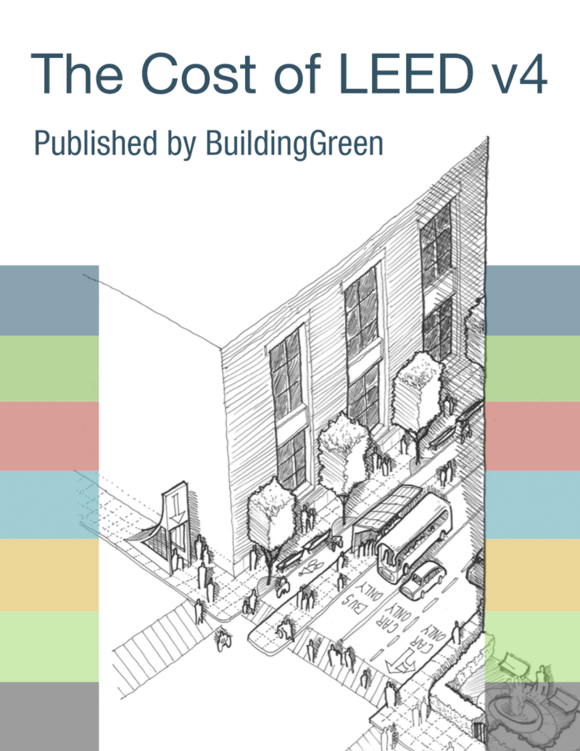LEEDuser’s viewpoint
Explore this LEED credit
Post your questions on this credit in the forum, and click on the credit language tab to review to the LEED requirements.
Credit language

© Copyright U.S. Green Building Council, Inc. All rights reserved.
Requirements
For this prerequisite smoking includes tobacco smoke, as well as smoke produced from the combustion of cannabis and controlled substances and the emissions produced by electronic smoking devices. Prohibit smoking in the building. Prohibit smoking outside the building except in designated smoking areas located at least 25 feet (7.5 meters) from all entries, outdoor air intakes, and operable windows. Also prohibit smoking outside the property line in spaces used for business purposes. Smoking does not have to be prohibited within 25 feet (7.5 meters) if the code explicitly prohibits it. Communicate the no-smoking policy to occupants of the building and have in place provisions for enforcement. Residential only
Option 1. No Smoking
Meet the requirements above. OROption 2. Compartmentalization of Smoking Areas
Prohibit smoking in all common areas of the building. Prohibit smoking outside the building except in designated smoking areas located at least 25 feet (7.5 meters) from all entries, outdoor air intakes, and operable windows. Also prohibit smoking outside the property line in spaces used for business purposes. The prohibition must be communicated in building rental or lease agreements or condo or coop association covenants and restrictions. Make provisions for enforcement. If the requirement to prohibit smoking within 25 feet (7.5 meters) cannot be implemented because of code, provide documentation of these regulations. Each unit must be compartmentalized to prevent excessive leakage between units:- Weather-strip all exterior doors and operable windows in the residential units to minimize leakage from outdoors.
- Weather-strip all doors leading from residential units into common hallways.
- Minimize uncontrolled pathways for the transfer of smoke and other indoor air pollutants between residential units by sealing penetrations in the walls, ceilings, and floors and by sealing vertical chases (including utility chases, garbage chutes, mail drops, and elevator shafts) adjacent to the units.
- Demonstrate a maximum leakage of 0.50 cubic feet per minute per square foot (2.54 liters per second per square meter) at 50 Pa of enclosure (i.e., all surfaces enclosing the apartment, including exterior and party walls, floors, and ceilings) or establish a baseline and demonstrate a 30% improvement in leakage.
What does it cost?
Cost estimates for this credit
On each BD+C v4 credit, LEEDuser offers the wisdom of a team of architects, engineers, cost estimators, and LEED experts with hundreds of LEED projects between then. They analyzed the sustainable design strategies associated with each LEED credit, but also to assign actual costs to those strategies.
Our tab contains overall cost guidance, notes on what “soft costs” to expect, and a strategy-by-strategy breakdown of what to consider and what it might cost, in percentage premiums, actual costs, or both.
This information is also available in a full PDF download in The Cost of LEED v4 report.
Learn more about The Cost of LEED v4 »Frequently asked questions
|
What about vaping and e-cigarettes? The answer to this question is available to LEEDuser premium members. Start a free trial » (If you're already a premium member, log in here.) |
Documentation toolkit
The motherlode of cheat sheets
LEEDuser’s Documentation Toolkit is loaded with calculators to help assess credit compliance, tracking spreadsheets for materials, sample templates to help guide your narratives and LEED Online submissions, and examples of actual submissions from certified LEED projects for you to check your work against. To get your plaque, start with the right toolkit.

© Copyright U.S. Green Building Council, Inc. All rights reserved.
Requirements
For this prerequisite smoking includes tobacco smoke, as well as smoke produced from the combustion of cannabis and controlled substances and the emissions produced by electronic smoking devices. Prohibit smoking in the building. Prohibit smoking outside the building except in designated smoking areas located at least 25 feet (7.5 meters) from all entries, outdoor air intakes, and operable windows. Also prohibit smoking outside the property line in spaces used for business purposes. Smoking does not have to be prohibited within 25 feet (7.5 meters) if the code explicitly prohibits it. Communicate the no-smoking policy to occupants of the building and have in place provisions for enforcement. Residential only
Option 1. No Smoking
Meet the requirements above. OROption 2. Compartmentalization of Smoking Areas
Prohibit smoking in all common areas of the building. Prohibit smoking outside the building except in designated smoking areas located at least 25 feet (7.5 meters) from all entries, outdoor air intakes, and operable windows. Also prohibit smoking outside the property line in spaces used for business purposes. The prohibition must be communicated in building rental or lease agreements or condo or coop association covenants and restrictions. Make provisions for enforcement. If the requirement to prohibit smoking within 25 feet (7.5 meters) cannot be implemented because of code, provide documentation of these regulations. Each unit must be compartmentalized to prevent excessive leakage between units:- Weather-strip all exterior doors and operable windows in the residential units to minimize leakage from outdoors.
- Weather-strip all doors leading from residential units into common hallways.
- Minimize uncontrolled pathways for the transfer of smoke and other indoor air pollutants between residential units by sealing penetrations in the walls, ceilings, and floors and by sealing vertical chases (including utility chases, garbage chutes, mail drops, and elevator shafts) adjacent to the units.
- Demonstrate a maximum leakage of 0.50 cubic feet per minute per square foot (2.54 liters per second per square meter) at 50 Pa of enclosure (i.e., all surfaces enclosing the apartment, including exterior and party walls, floors, and ceilings) or establish a baseline and demonstrate a 30% improvement in leakage.
In the end, LEED is all about documentation. LEEDuser’s Documentation Toolkit, for premium members only, saves you time and helps you avoid mistakes with:
- Calculators to help assess credit compliance.
- Tracking spreadsheets for materials purchases.
- Spreadsheets and forms to give to subs and other team members.
- Guidance documents on arcane LEED issues.
- Sample templates to help guide your narratives and LEED Online submissions.
- Examples of actual submissions from certified LEED projects.
|
What about vaping and e-cigarettes? The answer to this question is available to LEEDuser premium members. Start a free trial » (If you're already a premium member, log in here.) |


